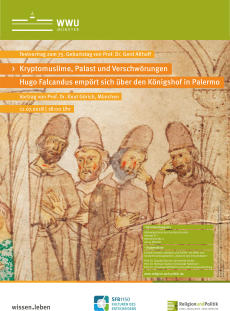Hugo Falcandus and the Royal Court in Palermo
Lecture on the occasion of the 75th birthday of medieval historian Prof. Dr. Gerd Althoff

On the occasion of the 75th birthday of the medieval historian Prof. Dr. Gerd Althoff of the Cluster of Excellence, the Munich historian Prof. Dr. Knut Görich will give a lecture on how the medieval writer Hugo Falcandus described the Kingdom of Sicily (1130-1861). “The chronicle ‘Liber de regno Sicilie’ by the so-called Hugo Falcandus is the most important source for the history of Norman royalty in the second half of the 12th century,” explains Prof. Görich. As a result of his critical view of the royal court in Palermo, the text is often assigned to the court criticism genre – which is only superficially the case, however; “despite all the disapproval of slander, intrigue, greed and fame of the courtiers, concern about the imperiled salvation of their souls is hardly worth a remark to the author”. According to the historian of the Ludwig-Maximilians-Universität München (LMU), the contradictions of his moral judgements have always perplexed.
The public lecture is entitled “Kryptomuslime, Palast und Verschwörungen: Hugo Falcandus empört sich über den Königshof in Palermo” (Cryptomuslims, Palace and Conspiracies: Hugo Falcandus is Outraged at the Royal Court in Palermo). It will be held on Wednesday, 11 July 2018, at 6 pm in the lecture theatre building of the Cluster of Excellence, Room JO 1, Johannisstraße 4 in Münster. The event is hosted by the Cluster of Excellence, the Collaborative Research Centre 1150 “Cultures of Decision-Making” of the University of Münster and the historians Prof. Dr. Claudia Garnier, Prof. Dr. Christiane Witthöft and , Prof. Dr. Hermann Kamp. Gerd Althoff is a senior professor of medieval history at the University of Münster and a Member of the Board of Directors of the Cluster of Excellence “Religion and Politics”, of which he was speaker from 2007 to 2011.
Multi-religious conditions in Sicily
Regarding the subject of the lecture, Knut Görich explains that the identity of the writer Hugo Falcandus and the question of the “causa scribendi”, or what he intended to portray in work, is still engaging scholars today. It is considered certain that he was not a native: “The view of the multi-ethnic and multi-religious conditions in Sicily is an outsider’s view. The forms and practices of the exercise and representation of power, which administrative experts from the Byzantine and Fatimid territories had taught to the kingdom, which had only been founded in 1130, are foreign to him.” His critique was aimed at the claim with which converted eunuchs staged their elitist status at court as well as the withdrawal of kings from public life. According to Görich, Falcandus, as a highly biased observer, describes the competition of various elites for access to the ruler and for participation in decision-making – “and only with special narrative strategies can he overcome the defeat of the group of people to whom he himself belongs”. Accordingly, the question of Hugo Falcandus’ perspective of perception ultimately leads to the question of the causa scibendi of his work. (exc/maz/vvm)


